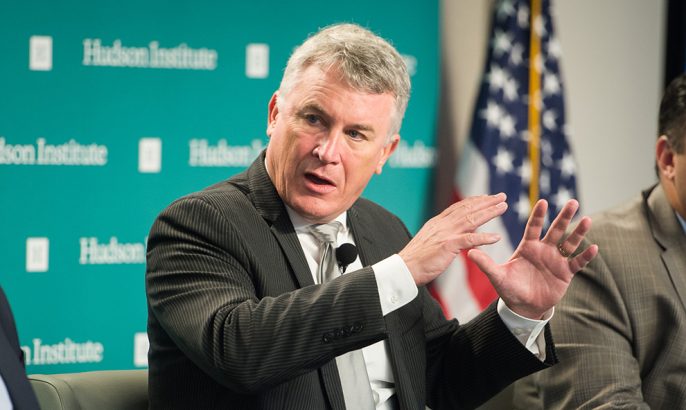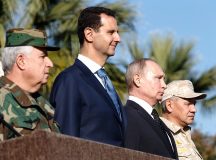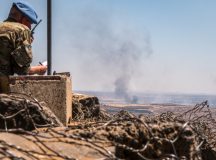Michael Doran is the Senior Fellow and Director of the Center for Peace and Security in the Middle East at the Hudson Institute and co-host of the podcast Counterbalance. Aaron MacLean is a senior fellow at the Foundation for Defense of Democracies. This interview was broadcast by the School of War podcast and we republish a lightly edited version of the transcript here with the kind permission of Aaron MacLean. To listen to the unabridged interview, click here (episode 118).
Is Hamas Winning?
Aaron MacLean: How is Israel’s war against Hamas proceeding and how do battlefield and diplomatic developments there fit into the broader regional competition with Iran? The Israelis took out a senior IRGC commander and his associates last week in a very significant strike in Damascus, but I’m pretty pessimistic about how things are going. Today we bring Mike Doran back to the show to see if my pessimism is warranted. As I say, my questions for you come from a place of deep pessimism, Mike, at least from where I sit. I’m curious about where you sit as somebody who has followed and written brilliantly about the Middle East throughout your career. We’ve had the World Central Kitchen incident and the blowback to that in the United States, with Biden apparently telling Netanyahu that he supports an immediate ceasefire. And then the report just yesterday – this all happened so quickly – that the Israelis have pulled their manoeuvre units out of Southern Gaza. They say that the official line is they’ve pulled it out to prepare for the final offensive in Rafah. I don’t know if I believe that.
Mike Doran: And they say it has nothing to do with the American pressure, which is a pretty good sign that has a lot to do with the American pressure.
AM: So I have one big question for you, and we’ll just kind of unpack it here over the course of the next 30 minutes or so: is Hamas winning?
MD: Well, that is a great question. Is Hamas winning? Let’s first define victory because I don’t think there’s an easy answer to it. The Israelis defined victory as return of the hostages, destruction of Hamas as a military organisation, and destruction of Hamas as an organisation capable of governing Gaza. So if we go by that metric, then we see what victory for Israel would mean. It would mean fulfilling all of those things. At this stage, it has not fulfilled any of them, but it’s well on the way. All that stands between the Israelis and victory, as we have just defined it, is basically taking over Rafah.
Destroying Hamas as a political organisation may take longer, but as a military organisation, Hamas has four brigades, the Israelis tell us, in Rafah. And if Israel could take that, then it will destroy Hamas as a potent military organisation. And by taking Rafah, then Israel will control the crossings from Egypt, which is the economic lifeline of the whole Gaza Strip. And as long as Hamas controls those, then it can control the distribution of aid and everything else. And it retains its ability to be the dominant political element in the Strip. But as you noted here with your opening description, the United States is putting enormous pressure on Israel not to go into Rafah. And that’s what I think this pull-out is all about.
What does Hamas need to win? It just has to survive. If it survives, if it prevents Israel from achieving any of the war aims that it has defined for itself, then it wins, I think. It’s already gained a lot from this operation. For all that it has lost, and it has lost an enormous amount, it’s more popular on the West Bank now than ever before. If it survives as an organisation capable of intimidating everyone else in the Gaza Strip, that I think is victory for Hamas.
Is it winning? I would say it had a very good week. Wars go through lots of ups and downs and surprising things happen that nobody expects. But I would say that total victory for the Israelis is still some distance away. And the closer we get to the November presidential election, the more American pressure on Israel is going to grow not to take Rafah. To me, it’s an open question as to whether the Israelis are going to get to Rafah anytime soon.
Let me just add to that though, the domestic political pressure on any Israeli government to go to Rafah and to destroy Hamas is, I think, overwhelming. I think sooner or later the Israelis are going to get there, but exactly when that’s going to happen is impossible to say.
AM: On your last point about Israeli political will, I was there in December and I think it’s hard if you don’t go there to appreciate the intensity of public feeling on this question. As bad as 10/7 seems, even from a distance, it’s hard to realise how strongly, and how justifiably, in my opinion, they feel about the goals that they’ve set themselves. Nevertheless, it is no surprise to anyone that the clock of American toleration appears to be, if not out, very close to out.
I was sceptical at the start of a large-scale ground operation in Gaza, and I was sceptical when Bibi said that the goal was the destruction of Hamas. Not because I don’t sympathise with the goal, but because it seemed to me from a purely military standpoint that what was being contemplated there was going to take a lot of time, even to complete the military destruction of Hamas. And Israel was still not going to destroy whatever would follow on an insurgent form, or the ideology. That was not actually accomplishable by IDF action. But even the concrete goal of military destruction was going to take months and months, and I’m amazed they’ve made it six months, because the American political clock was only one of the ticking clocks that mattered. There was the reservist service clock which also appears to be about up. There was a defense industrial base resource issue that is intertwined with the American issue. And there’s an Israeli political clock, and that looks to be about up too, now we have protests in the streets again.
I basically agree with how you define victory, but the burden then is all on Israel. They have to get 100 per cent of the way to their defined goal. But Hamas, if it can keep Israel at 99 per cent, Hamas wins. And I am worried, Mike, I’m worried.
The Biden Administration and American Strategy
MD: Yeah, I’m concerned as well. I’m disappointed by the Biden administration. I was in the White House working on the Middle East during the second Lebanon War, and after a month the American patience with the Israelis was wearing thin, for sure. I didn’t love that then, when our patience started to wear thin, but there was no credible plan that the Israelis had about how they were actually going to defeat Hezbollah. The war was dragging on and we couldn’t see that, okay, one more week, two more weeks, and the situation is going to be appreciably different than it is today. But in this case, we can see the Israelis have systematically dismantled all of these Hamas battalions. There are four battalions left, they’re in Rafah. If the Americans give a green light, the Israelis are going to go in and they’re going to dismantle those battalions. So we are really only a matter of weeks away. We know exactly what’s going to happen and we have no reason to believe that it’s not going to happen.
And so why has the American clock run out? I mean, I have my theories, but the Americans are stealing defeat from the jaws of victory for no good strategic reason whatsoever. Is it going to make that much difference to Joe Biden’s election hopes if the Israelis have two more weeks of war in Gaza? I don’t think so.
AM: What is your theory about why the Biden administration has acted as it has?
MD: Well, I’ll give you the theory in one line in just a second. But before I do that, let me just point out that you and I, Aaron, I think that we see the world very similarly and we approach a problem like this from a similar point of view. That is to say, we see an ally that has been attacked by an enemy. We see Hamas is an enemy of the United States and a a proxy of Iran. And so we say, ‘What is the American interest?’ And we read the region as an American-led coalition against an Iranian-led coalition.
That’s not the way the Biden White House looks at any of these problems. It starts from the point of view that the United States is not the leader of a coalition against Russia, against Iran, against China. They see the United States as the manager of the global system. And they see the Russian invasion of Ukraine or the Hamas’ attack on Israel as a rogue actor acting against the system. So the question they ask is, ‘How do I put the system back into good repair and how do I compel the rogue actor to become part of the system, or operate if not directly in cooperation with the system, then as less of an obstruction to it?’
It was amazing when Putin went into Ukraine, how much the administration kept talking about trying to give Putin an off ramp. Now they’re trying to give Hamas an off ramp. The administration dos not seek victory for Israel, or victory for the American coalition, but is rather asking ‘how do we de-escalate the situation?’
The key things that happened last week were the World Central Kitchen tragedy and the Israeli strike on General Zahedi in Damascus on the same day. That led to fears in the White House of escalation between Israel and Iran and possibly a larger war that would suck the United States in. Biden called up Netanyahu on Thursday and read him The Riot Act and said, ‘I want a ceasefire agreement.’ And right now we have all the major parties meeting in Cairo, with the Americans are bringing all the pressure they can to bear on the Egyptians, on the Qataris, on the Israelis, on everyone to bring this thing to an end: a hostage for prisoners deal and a cease fire. And then they hope to extend that cease-fire all the way to the election. They’re really trying to bring the war to an end this week.
That was all by way of a prelude. My one sentence answer is: this administration came into office wanting to reverse Donald Trump’s maximum pressure campaign against Iran. They thought that that was the grand strategic blunder of the new century. And they have a vision of regional order in which the United States and Iran have a strategic understanding, an accommodation. They do not believe that the US and Iran are going to become partners, but they do believe in the possibility of a mutual non-belligerency agreement. So Gaza for them [the Biden administration] is not an opportunity to really stick it to Iran as it would be for you and me. They see Gaza as something that was outside of the mutual non-belligerence agreement that they were working on with Iran, and they want to tamp it down so they can get back to the business of organising the region in parallel with Iran.
AM: And if they succeed in bringing about the kind of ceasefire that you just described, that would be a victory for Hamas on the terms that you laid out at the start of our conversation, on the assumption that it’s extended. And Hamas’s defensive concept will have worked. That concept doe not only involve trenches, machine guns and tunnels. At a more grand strategic level, it involves the hostages themselves, and the international media and the way in which incidents can be used. That defensive concept will have worked.
MD: Well, it totally worked. When I defined victory, I defined it just in terms of Gaza. In my view, this conflict is objectively not just an Israeli-Palestinian conflict or a war in Gaza. This war involves Hezbollah in the north, it involves the Houthis, it involves Iran’s militias in Iraq and Syria. And so it is, in a sense, an Israeli-Iranian war. I actually think it’s an Iranian-US war. It’s the Iranian alliance system against the American. That’s the proper way to frame it.
If the United States continues to do what it’s doing – which is to restrain its ally and allow Iran’s proxy to survive – it’s going to end up with Iran getting the upper hand. Iran has already demonstrated to the world, for the first time, that it can orchestrate all elements of the resistance alliance, bring all of its proxies to work in parallel, in order to achieve a very clear aim. And it’s disrupted international trade and shown China that ‘Hey, if you’re going to have a war with Taiwan and you want to move an aircraft carrier group or two of the United States into the Persian Gulf beforehand, and if you want to threaten global supply chains, we can help you with that. We’ve got the tool.’
AM: Even if Israel did defeat Hamas according to the terms that you and I have been discussing, and that’s where it stopped, with no action in the North, with the Red Sea remaining closed, etc., etc., etc. it’s actually much less of a close call in terms of whether Iran or the United States is coming out ahead. It’s clearly Iran. Iran is clearly winning. A world in which the Red Sea is substantially closed to commercial traffic and where this ragtag proxy is shooting at American naval vessels on a pretty regular basis and living to tell the tale again and again and again, is objectively a world that is worse for America and for America’s friends.
To your point about China, I’ve never understood the argument that America needs to retrench in the Middle East and retrench in Europe in order to be better prepared for the Pacific. It’s never been clear to me what the consequences of retrenchment would look like, or how those consequences would in any way help us in the Pacific, and I’m someone who grants that China is the greatest national security threat to the United States.
We actually haven’t withdrawn from the Middle East. CENTCOM’s there, we’ve got a lot of stuff, we could surge assets into the region anytime we want, absent another major conflict. And yet because we’re so afraid of escalation, we’re so afraid of the Iranian threat, we’re not actually getting any return on that investment. And we’re watching what would happen in the Middle East as though we weren’t there, we’re watching the region evolve to a post-American order, even though it’s not technically post-American. America is still around [but] managing its own decline.
MD: I couldn’t agree with you more. We said we were going to deter the Houthis, what is basically a ragtag militia compared to the United States of America. But we failed to deter it. And now we say, ‘Oh, well’ instead of trying to deter the Houthis by seriously directing our forces to kill senior Houthi leaders, to kill the Iranian liaison officers that are supplying the Houthis, to shut down the Iranian supplies to the Houthis, to destroy the arsenals, also to support the anti-Houthi elements in Yemen who will do the work for us. Instead of doing that, we say, ‘Well, we’ll bring calm to the region by restraining our ally, Israel, and then the Houthis will stop.’ That’s what they’re thinking in the White House, I guarantee you. As Joe Biden sees it and as his advisors see it, the question is do we escalate against the Iranians and the Houthis in order to bring order to the region, or do we restrain the Israelis because we want to have a quiet life for the election. What do we do? And they’ve decided on restraining the Israelis. That’s the answer.
Misreading Iran
AM: The Biden team worldview – to see themselves as managers of the system, as able to bring people back to the table and make them less roguish and so forth – requires believing things about the Houthis, but also about the Iranians, that seem to me to be manifestly not true. Namely, that they look at their region and understand their interests like we do. In fact, they’re a revolutionary power guided by a theocratic vision. Yes, they have to live in the real world and that requires certain compromises. Nevertheless, when they say they wish the Zionist entity were gone, they mean it, and for very deeply rooted reasons that are not just window dressing for domestic politics. They’re an empire. They have an obvious imperial program seeking control in their region through traditional imperial techniques of proxies and subsidies and threats and everything that Caesar Augustus would understand perfectly well. And yet we sit down and we expect them to want peace and material gain like we Americans want peace and material gain. That approach strikes me as destined to fail. Am I reading the Iranians correctly? You have been paying attention to them, and for the matter, paying attention to the Biden people in a deeper way than I have over the years.
MD: I agree with all that. When I debate people about this, I always say, ‘Here’s a conversation that didn’t take place in Tehran. When Qasem Soleimani said, “I’m going to start arming militias in Iraq to shoot EFPs at American Soldiers”, Ali Khamenei, the Supreme leader didn’t say, “Oh, what if the Americans escalate? We better not do that. We better de-escalate.”’ They never talk like this. They never think that way.
When I was in the White House in 2006 we – kind of by design, kind of by accident, because there was a number of us who were all pushing in the same direction – put a carrier group in the Gulf, got the first sanctions resolution through the United Nations, and then we started rounding up IRGC fighters all over Iraq (including in the courtyard of one of our allies, an Iraqi politician). The Iranian leaders in Tehran felt the hot breath of the United States on the back of their neck, which doesn’t happen very often. And when American power is barrelling down on you, economic, military, political, and otherwise, it’s scary. So they totally went to ground in Iraq. They started floating ideas of making concessions on their enrichment of uranium and so on. And how did we respond? Like Pavlov’s dogs. We said – I don’t want to go into who it was, but significant people in our system – ‘Oh, well, let’s sit down and negotiate with them.’ And I thought, ‘No, you just had a lesson in what makes these guys make concessions. You’ve got to punch them in the nose. It doesn’t have to be all out war. Punch them in the nose, show them that you mean business, and then you’ll get something out of them. But so quickly wanted to help the Iranians find the off-ramp and teach them how to be good members of the system. It’s remarkable.
Aaron MacLean: There was a report just a few days ago that suggested we were dangling taking the Houthis off the terror list – they’d recently been put back on – if they stopped shooting at us. A perfect illustration of that bizarre inability we have to learn the obvious lessons.
MD: Another thing I always say, and I really mean it when I say it, is ‘didn’t anybody ever beat these guys up on the playground?’ I mean, have they not experienced a bully in their own lives and been taught the lesson that the guy actually likes it when you’re hurt?
AM: And all of this that we’re discussing is occurring when Iran lacks a nuke. What’s going to happen when they get one? And I use the word when. What is going to happen when they get one?
MD: I’ll tell you what’s not going to happen. They’re not going to have a conversation around Ali Khamenei’s desk and say, ‘Well, now that we’ve got a nuke, let’s de-escalate’. That’s not going to happen. It means that Hezbollah, Hamas and the Houthis are going to be operating against Israel under an Iranian nuclear umbrella.
I guarantee you, though we haven’t had anyone come out and say it clearly yet, when the Biden administration is out of power and people start telling the stories, they’re going to say, ‘Well, we had to restrain the Israelis because we were afraid that the Iranians would make a rush for a nuke.’ The Iranians are already getting benefits because they are a few steps away from having a device. Those benefits are going to grow when they get a device.
This is obvious. So we should look at our own behaviour and the restraint that we’re imposing on our only ally who is willing to contest the Iranians. So just as the Ukrainians are the ally that is fighting Russia, so we don’t have to do it, the Israelis are not dragging us into a conflict of Iran. They can be a tool in our hand to weaken Iran so that we don’t have to do it. And instead of building them up so that they can help protect our position in the region, we’re going to tear them down and make the Iranians stronger. It makes no sense.
AM: I was hoping you would disabuse me of the reasons for my depression. It hasn’t exactly happened, but it has been a fascinating conversation.
MD: Yeah, I used to follow as closely as I could all of the strategic discussions in al-Qaeda. And al-Qaeda, every time they suffered a terrible setback, they would always say to themselves, ‘Well, okay, this wasn’t good. But the strategic picture has been clarified.’ So, Aaron, this last week wasn’t good for our side, but the strategic picture has been clarified.





































